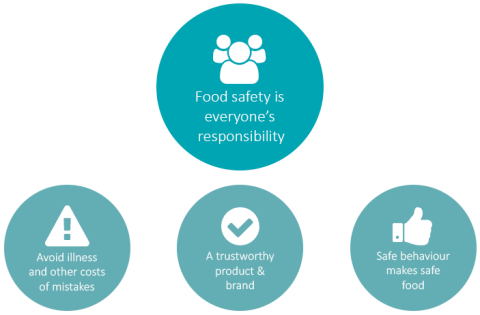Published
Food safety culture is about attitudes, behaviours and the priority given to food safety in an organisation. In a food business, it is how everyone (owners, managers, employees) thinks and acts in their daily job to make sure the food they make or serve is safe.
In a strong food safety culture, people take responsibility, pride and care in producing safe food. They understand the importance of making safe food and the consequences of things going wrong. People have the right knowledge and skills and a genuine commitment to doing things the right way, every time.
Food safety culture starts at the top but needs support from everyone across the business. It includes not only food handlers, but also people involved in cleaning, maintenance, purchases, recruitment and other activities, as they contribute to the business’s food safety and culture too.
To learn more, watch our introduction to food safety culture video for food businesses or food handlers.
Read more information on characteristics of a strong culture in our food safety culture poster (PDF 85kb).
Why it's important
In Australia, people expect to enjoy their food with the assurance it is safe to eat. A good food safety culture can protect:
- consumers from illnesses and death from unsafe food
- your brand's reputation
- your business from financial loss.
Preventable problems
There are around 4.7 million cases of foodborne illness in Australia each year. Unsafe food causes about 47,900 hospitalisations and 38 deaths.
About 80 food products are recalled each year. Most recalls are due to contamination by disease-causing microorganisms, or allergens that were not declared on the label.
We can link unsafe food to poor hygiene practices or mistakes by people handling food and equipment. This can happen even when people have received training and the businesses are inspected and audited.
These problems are largely preventable, if there is a strong food safety culture in the
business.
Food businesses need to focus on their people as well as processes. People are the key to food safety systems working properly. After all, its people who make the decisions, handle the food, use and maintain equipment and clean things up.
First steps
We have some simple tools and resources to help businesses and regulators work together to improve food safety culture. It breaks down to a 3-step process: 'Know, Do, Follow through':
Step 1: Know where your business stands
We've put together a short questionnaire to help you do a quick 'health check' of your business's food safety culture. You'll get an idea of how your decision makers and team members rank the business's overall approach to food safety - from the general philosophy in the workplace, to training and monitoring arrangements, to the relationship with food regulators. You can then move onto making targeted improvements.
Step 2: Do something to make a difference
Achieving a strong food safety culture takes:
- effective leadership and commitment
- contributions and support from everyone in your business.
- Read more about how to shape and strengthen your food safety culture.
Step 3: Follow through for a long-lasting impact
Track and improve your food safety culture.
We have been working with food regulatory agencies to trial some food safety culture resources with selected food businesses. These resources include ‘culture maturity matrix’ documents to help regulators and businesses to identify strengths and weaknesses and track progress.
Our draft Step 3 resource aims to help businesses measure their food safety culture in more detail. Please note it is not a validated tool for auditing or regulatory purposes. TIP: You need to divide the final combined score by the number of participants, to see which maturity category your business fits into.
Food safety culture in action
Read examples of how governments and food businesses have improved food safety culture on the Food safety culture in action page.
Resources
These resources are designed to help food businesses understand, shape and improve their food safety culture. Regulators may also find them useful in discussions with businesses.
FSANZ resources:
- Poster What does a strong food safety culture look like? (PDF 218kb)
- Animation Food safety culture - for food businesses
- Animation Food safety culture - for food handlers
- Presentation What is food safety culture? (PDF 676 kb)
- Step 1 Know - Food safety culture questionnaire (PDF 218kb)
- Step 2 Do - Checklists for change (PDF 239kb)
- Step 3 Follow through - Track and improve (maturity matrix and questionnaire) (PDF 965kb)
Other resources:
-
National tools for food service businesses:
A suite of national tools was developed by a working group of the joint food regulation system, as part of a project aiming to understand and improve food safety culture in food service businesses. The tools are designed for authorised officers (e.g. EHOs) to work with small businesses. They include a questionnaire to collect information about staff's roles and responsibilities in a food business, and their understanding of egg handling and/or allergen management. The answers to the questionnaire can be used with the Small Business Maturity Model and the Behaviour Change Guide to gauge how mature the business’s food safety culture is and to improve their overall food safety management.
* Questionnaire for EHOs to use with businesses (PDF 318kb)
* Small Business Maturity Model and Behaviour Change Guide (PDF 272kb)
- USA assessment tool for restaurant managers (Excel 40KB) - see US Environmental Health Specialists Network web page

